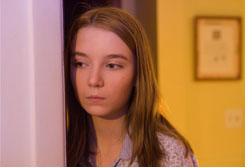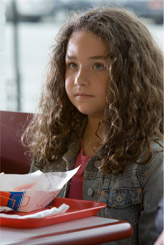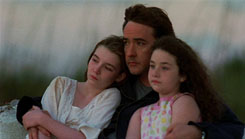While a perfect vehicle for explosion and massive gunfire effects, blood and gore worship, and paeans to patriotism, war on the big screen is impactful not only for such spectacular moments.
Grace is Gone, written and directed by James Strouse , is built on this often ignored premise, and explores the quiet grief that comes from the casualties of war.
Not only does it humanise and make relevant the war in Iraq, telling of the intra-personal wars that the family members of the dead soldiers fight when the caskets return home.
It actually goes so far to turn convention on its head, so that the war hero is actually a woman, and the one who has to brace his family for the bad news is her husband.
The intense spirit of the movie and excellent acting has won the film many international accolades, such as the Audience Award for Drama and Best Screenplay Award at the 2007 Sundance Film Festival.
The Plot
Stanley Phillips, played by John Cusack (Runaway Jury) is a former military man who was cut from the Army because of his bad eyesight.
 Now working at a home supplies store, he is left struggling with his patriotism and conflicting feelings as his wife, Grace, a sergeant in the army, gets sent to Iraq, leaving him to take care of their young daughters, 12-year-old Heidi (Shélan O’Keefe) and 8-year-old Dawn (Gracie Bednarczyk ).
Now working at a home supplies store, he is left struggling with his patriotism and conflicting feelings as his wife, Grace, a sergeant in the army, gets sent to Iraq, leaving him to take care of their young daughters, 12-year-old Heidi (Shélan O’Keefe) and 8-year-old Dawn (Gracie Bednarczyk ).
One of the unique points of the script is how it deviates from the usual stereotype of the weepy, worried wives of soldiers. In this case, Stanley joins a support group for the spouses of soldiers in Iraq, which doesn’t quite work for him.
Stanley is clueless as to how to take care of the 2 girls and tries to instill a strict discipline in them. Despite this tough exterior, however, it’s apparent that he loves them dearly and simply doesn’t know how to express it.
One morning, Stanley opens the door to 2 soldiers who bear the news of his wife’s death in battle. Unable to accept or deal with the death of Grace, Stanley decides not to break the news to his daughters and instead, takes a break from his routine of eating in and brings the girls out for dinner.
Stanley’s effort to take a break from routine leads to him bring the girls on an unexpected road trip in the middle of their school term to the Enchanted Gardens theme park, at the suggestion of Dawn. As they journey along, he begins to ease up on the tough disciplinary measures he placed on his daughters before. Stanley also struggles to hide his emotional turmoil behind a happy façade, but lets his grief take over when he is alone.
Throughout the trip, he calls home on several occasions to listen to Grace’s voice on the answering machine, and records messages almost like he was speaking to h er on the phone. Through these beautiful soliloquies, we delve into the soul of this quiet, reserved family man and find that he is burdened with many issues of his own.
er on the phone. Through these beautiful soliloquies, we delve into the soul of this quiet, reserved family man and find that he is burdened with many issues of his own.
The family stops over at Stanley’s mother’s house and the girls meet their good-for-nothing uncle, John (Alessandro Nivola), the polar opposite of their father, who is vocally anti-war and anti-establishment. When John finds out that Grace is dead and that Stanley hasn’t told the kids yet, he tries in vain to persuade his brother out of his seemingly ill-conceived plan to bring the girls on the trip to the theme park. Stanley insists on continuing with his plan and leaves with the girls.
Throughout all this, Heidi senses that something is amiss in her father’s queer behaviour and the strange nice words spoken by her teacher. The intelligent prepubescent girl shows a maturity way beyond her years, probably due to her having to assume the role of the woman of the house in her mother’s absence. With the help of a few phone calls, she deduces the reason for her father’s actions but refuses to accept it for a fact.
The Music
The film’s music conveys the mood of the protagonist really well, playing out his innermost emotions even in the happier scenes.
The theme song “Grace is Gone” received 2 nominations at the 65th Golden Globe Awards. Veteran actor-director Clint Eastwood’s score was nominated for the Best Original Score Award and the song “Grace is Gone“, part of Eastwood’s 5th movie soundtrack project which had music by him and lyrics written by Carole Bayer Sager received a nomination for Best Original Song. The song was also pronounced the Best Song at the 12th Satellite Awards .
The Verdict
Overall, Grace is Gone is a beautiful portrait of a father’s love for his daughters and the struggles of a family coming to terms with their mother’s death.
Even if bereft of music to set the mood, Cusack delivers powerful performances in several silent portions of the film that conveyed emotion so intense and raw that they give UrbanWire goosebumps.
 Though Cusack’s acting in Grace Is Gone has been lauded all over by various movie critics as probably his best performance ever, even worthy of an Oscar, Shélan O’Keefe’s role as Heidi is very noteworthy as well.
Though Cusack’s acting in Grace Is Gone has been lauded all over by various movie critics as probably his best performance ever, even worthy of an Oscar, Shélan O’Keefe’s role as Heidi is very noteworthy as well.
For her debut role, O’Keefe did a splendid job in playing a girl who had grown up too fast. With those big eyes of hers brimming with feelings and the lines read so convincingly, it was a shame that she didn’t receive any nominations for her role as Heidi.
A must-see for sentimental movie buffs.
UrbanWire gives Grace Is Gone 4.0 out of 5 stars
Movie Details
Opens: Mar 20
Running time: 86 mins
Language: English
Cast: John Cusack, Shélan O’Keefe, Gracie Bednarczyk, Alessandro Nivola
Director: James C. Strouse

